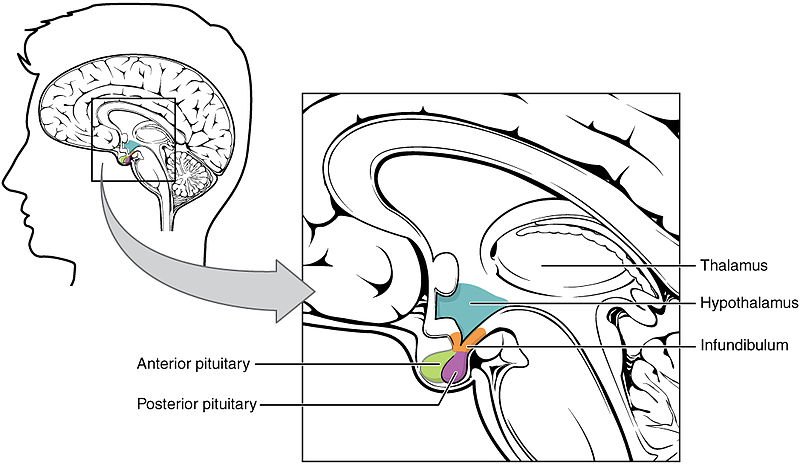The role of Menin in age-related physiological changes and the potential therapeutic benefits of D-serine supplementation in mice

Researchers have recently discovered that a protein called Menin plays a significant role in the aging process.
Menin is found in the hypothalamus, a small yet essential part of the brain responsible for regulating several bodily functions such as hunger, thirst, sleep, and hormone production.
As we age, the level of Menin in the hypothalamus declines, leading to an increase in neuroinflammation that promotes age-related processes in the brain and the rest of the body.
What is the Hypothalamus?
The hypothalamus is a small but crucial part of the brain located just above the brainstem. It acts as a bridge between the nervous and endocrine systems and is responsible for regulating a wide range of bodily functions.
The hypothalamus has a lot on its plate – it regulates body temperature, hunger, thirst, sleep, mood, and hormone production. It also plays a role in the body’s response to stress and controlling the release of hormones from the pituitary gland. Overall, the hypothalamus is critical for maintaining the body’s balance and health.

For example, when you’re feeling hungry, it’s the hypothalamus that sends signals to your body to release hormones that make you feel hungry. When you drink water, the hypothalamus helps regulate the water balance in your body. When you’re feeling stressed, the hypothalamus triggers the release of stress hormones like cortisol.
The hypothalamus is also important in regulating the body’s sleep-wake cycle. It receives input from the eyes and helps to synchronize the body’s internal clock with the external environment.
The decline in Menin affects various aspects of aging, including cognition, bone mass, skin thickness, and lifespan.
To explore this decline, the researchers created knockout mice, where Menin activity could be inhibited.
They observed that younger mice with reduced Menin activity had increased neuroinflammation, cognitive decline, reduced bone mass and skin thickness, and modestly reduced lifespan.
Perpetua Life KSM-66® Ashwagandha Gummies | 600mg
Perpetual Life’s Ashwagandha Gummies you get the patented KSM-66® organic ashwagandha root in this formula. This ensures that you’re getting at least 5% bioactive withanolides at the clinically studied dose of 600 mg in every capsule.
(Use Coupon Code FOODNURISH at checkout for 10% OFF)
MEN1 Gene
The MEN1 gene is responsible for producing the protein Menin. It is located on chromosome 11 and is classified as a tumor suppressor gene because mutations in this gene can lead to the development of tumors.
Chromosome 11 is one of the 23 pairs of chromosomes in humans. [1]
Menin has been found to play a role in many different bodily functions, including hormone regulation and immune system function.
Mutations in the MEN1 gene can lead to a condition called Multiple Endocrine Neoplasia Type 1 (MEN1), which is characterized by the development of tumors in the endocrine glands. [2]
Interestingly, loss of Menin also led to a decline in the levels of D-serine, an amino acid that acts as a neurotransmitter and can be found in soybeans, eggs, fish, and nuts.
The researchers found that Menin regulates an enzyme involved in D-serine synthesis.
Reversing age-related Menin loss by delivering the gene for Menin into the hypothalamus of elderly mice led to improved bone mass and skin thickness, better learning, cognition, and balance.
Additionally, dietary supplementation with D-serine induced similar benefits on cognition, though not on the peripheral signs of aging.
What is D-Serine?
D-Serine is synthesized in the body from another amino acid called L-Serine, which can be obtained through the diet from a variety of protein-rich foods such as meat, fish, dairy, and soy products.
However, the body can also produce L-Serine on its own, so it is not considered an essential amino acid. D-Serine has gained attention in recent years for its potential therapeutic effects in neurological disorders such as schizophrenia and Alzheimer’s disease.
Bottom Line
Overall, Menin may be the key protein connecting the genetic, inflammatory, and metabolic factors of aging.
The researchers speculate that Menin’s decline may be one of the driving factors of aging and that D-serine could be a potentially promising therapeutic for cognitive decline.
However, there is still much to learn about Menin’s role in aging, including the upstream processes that lead to its decline and the potential for exploiting this pathway.
Leng L, Yuan Z, Su X, Chen Z, Yang S, Chen M, et al. (2023) Hypothalamic Menin regulates systemic aging and cognitive decline. PLoS Biol 21(3): e3002033. https://doi.org/10.1371/journal.pbio.3002033
Read Next




